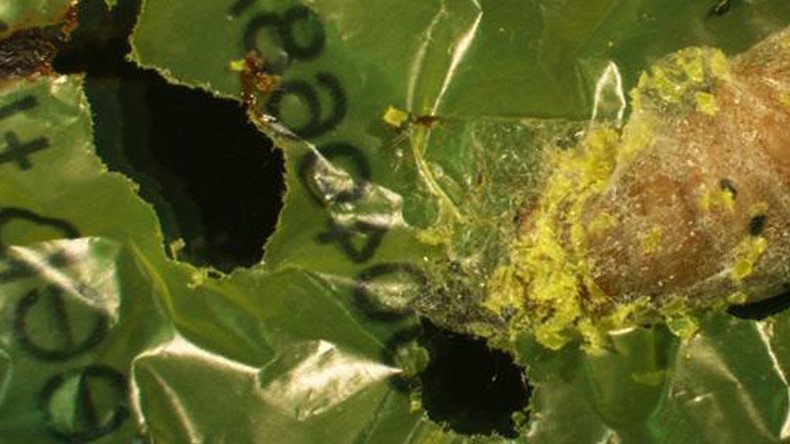Plastic-eating caterpillar could help solve pollution crisis – study (VIDEO)

A caterpillar commonly used as fishing bait has been shown to have an extraordinary appetite for plastic, which scientists say could help tackle pollution.
Cambridge University researchers have discovered that Galleria mellonella, known as the ‘wax worm’, so-called because of its fondness for eating wax in bee hives, can also chow down on polyethylene, the commonly manufactured plastic used to make shopping bags and food packaging.
Roughly 80 million tons (metric) of polyethylene are produced on the planet each year, a large percentage of which ends up in countless landfills around the world. The substance is notoriously hard to break down and can take centuries to degrade.
The wax worm seems to be nature's own solution to the problem and scientists have a chance discovery to thank for it.
Plastic-eating bacteria: Key solution to world’s pollution problem https://t.co/XXejFsryC6pic.twitter.com/oslZ2YCOYU
— RT (@RT_com) March 11, 2016
After researcher, and amatuer bee keeper, Federica Bertocchini, from the Institute of Biomedicine and Biotechnology of Cantabria (CSIC) in Spain, removed wax worms from the honeycombs in her hives she deposited them in an plastic shopping bag. She soon discovered though that the bag had become riddled with holes.
This discovery prompted Bertocchini to conduct experiments with her Cambridge colleagues, the results of which were published Monday in the journal Current Biology.
The team exposed about 100 wax worms to a typical plastic bag from a UK supermarket and found that holes started to appear after just 40 minutes. 12 hours later there was a reduction in mass of 92mg, which scientists say is extremely fast compared to other recent discoveries.
"If a single enzyme is responsible for this chemical process, its reproduction on a large scale using biotechnological methods should be achievable," Cambridge's Paolo Bombelli said in a statement.
"This discovery could be an important tool for helping to get rid of the polyethylene plastic waste accumulated in landfill sites and oceans," he added.
Bertocchini, the study’s lead author, echoed these sentiments "We are planning to implement this finding into a viable way to get rid of plastic waste, working towards a solution to save our oceans, rivers, and all the environment from the unavoidable consequences of plastic accumulation.”
READ MORE: Scientists reveal efficient way to degrade a plastic bag into liquid fuel













